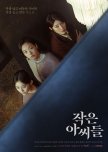Cette critique peut contenir des spoilers
Enjoyable but leaves some important things hanging
I am giving this is a high rating simply because I enjoyed every minute of it more than I thought I would, since I do not usually enjoy Korean suspense/mystery dramas. It was all quite compelling to me from the very beginning. I thought it would be woke, given the title, and full of aggressive feminist propaganda, which I don't normally like in my dramas. (I don't like any sort of heavy political propaganda in stories I consume purely for entertainment), but surprisingly, it's not. The women characters are not perfect Mary Sues portraying women as the better gender and as strong, independent, and perfect. They are flawed and very real and quite relatable. I've never been a fan of Kim Go-Eun (didn't like her in Goblin, but that was probably because I didn't like the way that character was written), but I thought she did a stellar job here portraying the slightly naive, slightly ditzy Oh In-Joo. In-Joo's story is super relatable, especially for those of us who have had to struggle financially. Her choices and her reactions are perfectly understandable, given the circumstances. I thought this character was what carried the whole story for me -- she is a very good depiction of a perfectly real human, not an idealized "woman power" version.
As for the story itself, the twists and turns, even though some a bit sketchy, especially in hindsight, were good enough to keep me glued to my seat and wanting more. Sadly, as with many Kdramas, the ending, although generally okay, felt a bit rushed. There are two particular story elements that I feel were not resolved satisfactorily and/or were problematic:
1. In Joo and Do-Il. This connection goes beyond a superficial attraction. They both help each other grow as the story progressed. In-Joo makes Do-Il care for someone again other than money and vengeance. Do-il helps In-joo navigate through the chaos that she had to go through and come out sane. I would have been okay with them remaining perfectly platonic all throughout the show, but the writers had to go beyond that. They obviously implied that there was something there, a mutual attraction. You can see it in the way Do-il looks at In Joo, the way he smiles when he sees her face, the decisions he made to keep her safe. Setting this connection and attraction up in this way makes the audience expect a resolution, but none were given in the end. They need not necessarily have ended up together, but they could have progressed to more than just a "see you around." I was expecting a progression to at least more closeness and openness about the way they feel. I understand In-joo might not be ready for a relationship after what she'd been through, and probably needs some self-reflection, but that could have been handled with a trusty old time jump, which might be cliche but, if done right, could have give us a more satisfactory ending for this particular story arc.
2. I find it strange that In-Hye and Hyo-Rin, two self-involved minors -- children, for all intents and purposes -- are allowed to roam the world with buttloads of cash and zero adult supervision. I am all for freedom and escaping oppressive situations, but teenagers, especially, need guidance. In-hye, despite her little diatribe at the end trying to justify her actions, is, for me, unforgivable. She is narcissistic, self-involved, and almost psychopathic in her lack of empathy for her loving sisters. Teenagers often go through this phase where they feel stifled by their family's love, but that is just a phase and part of growing up. The fact that she allowed her sisters to feel humiliated, rejected, hurt, just to fulfill her fantasies and desires is extremely self-indulgent, selfish, and cruel. Her lack of empathy is disturbing. Anyway, the teenage fantasy of escaping your family to explore the world is something everybody at some point has probably had, but there are ways to accomplish this while still being considerate. In-hye has no reason to escape her loving sisters. Her life situation is not ideal, but her sisters obviously love her. Instead of indulging in her selfish fantasy and escaping from her family, she should have learned to appreciate what she had and escaped her narcissistic worldview -- I'm going to get what I want and I don't care how you feel or what you think about it. Real progression for her would have been getting past her self-obsession and being there for at least In-Joo, who is left alone in the end. Hyo-rin's case is altogether different, but she still needs guidance, especially after everything that happened. I just find it incredibly irresponsible of the adults, including Do-il, to allow these kids to do what they want with no supervision whatsoever. Teenagers are notoriously liable to making wrong decisions that could affect the rest of their lives at this particularly volatile period of growth, so they do need someone mature to at least guide them. Are the writers campaigning for children to be able to do what they want and to turn away from their families?
There are other loose threads, but these two are the ones that made me unhappy with the ending. Overall, it was a fun ride and definitely worth watching despite the above-mentioned flaws.
As for the story itself, the twists and turns, even though some a bit sketchy, especially in hindsight, were good enough to keep me glued to my seat and wanting more. Sadly, as with many Kdramas, the ending, although generally okay, felt a bit rushed. There are two particular story elements that I feel were not resolved satisfactorily and/or were problematic:
1. In Joo and Do-Il. This connection goes beyond a superficial attraction. They both help each other grow as the story progressed. In-Joo makes Do-Il care for someone again other than money and vengeance. Do-il helps In-joo navigate through the chaos that she had to go through and come out sane. I would have been okay with them remaining perfectly platonic all throughout the show, but the writers had to go beyond that. They obviously implied that there was something there, a mutual attraction. You can see it in the way Do-il looks at In Joo, the way he smiles when he sees her face, the decisions he made to keep her safe. Setting this connection and attraction up in this way makes the audience expect a resolution, but none were given in the end. They need not necessarily have ended up together, but they could have progressed to more than just a "see you around." I was expecting a progression to at least more closeness and openness about the way they feel. I understand In-joo might not be ready for a relationship after what she'd been through, and probably needs some self-reflection, but that could have been handled with a trusty old time jump, which might be cliche but, if done right, could have give us a more satisfactory ending for this particular story arc.
2. I find it strange that In-Hye and Hyo-Rin, two self-involved minors -- children, for all intents and purposes -- are allowed to roam the world with buttloads of cash and zero adult supervision. I am all for freedom and escaping oppressive situations, but teenagers, especially, need guidance. In-hye, despite her little diatribe at the end trying to justify her actions, is, for me, unforgivable. She is narcissistic, self-involved, and almost psychopathic in her lack of empathy for her loving sisters. Teenagers often go through this phase where they feel stifled by their family's love, but that is just a phase and part of growing up. The fact that she allowed her sisters to feel humiliated, rejected, hurt, just to fulfill her fantasies and desires is extremely self-indulgent, selfish, and cruel. Her lack of empathy is disturbing. Anyway, the teenage fantasy of escaping your family to explore the world is something everybody at some point has probably had, but there are ways to accomplish this while still being considerate. In-hye has no reason to escape her loving sisters. Her life situation is not ideal, but her sisters obviously love her. Instead of indulging in her selfish fantasy and escaping from her family, she should have learned to appreciate what she had and escaped her narcissistic worldview -- I'm going to get what I want and I don't care how you feel or what you think about it. Real progression for her would have been getting past her self-obsession and being there for at least In-Joo, who is left alone in the end. Hyo-rin's case is altogether different, but she still needs guidance, especially after everything that happened. I just find it incredibly irresponsible of the adults, including Do-il, to allow these kids to do what they want with no supervision whatsoever. Teenagers are notoriously liable to making wrong decisions that could affect the rest of their lives at this particularly volatile period of growth, so they do need someone mature to at least guide them. Are the writers campaigning for children to be able to do what they want and to turn away from their families?
There are other loose threads, but these two are the ones that made me unhappy with the ending. Overall, it was a fun ride and definitely worth watching despite the above-mentioned flaws.
Cet avis était-il utile?









